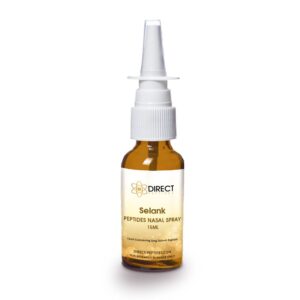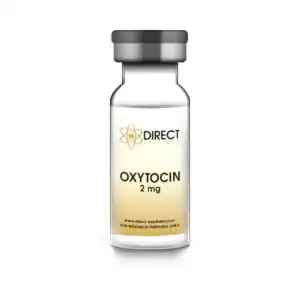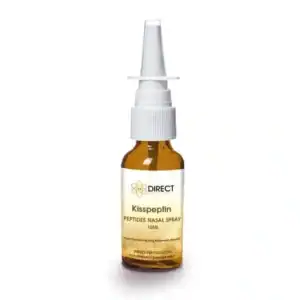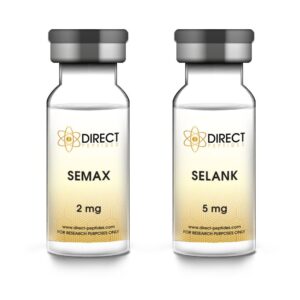The power of human connection is fascinating, and one key player in this complex web is a peptide known as the “love hormone.”
This naturally occurring substance plays an essential role in forming emotional bonds, whether in romantic partnerships, friendships, or the parent-child relationship. But how exactly does this peptide influence the strength of our relationships, and what does research say about its impact?
Trust is the foundation of any strong relationship, and this “love hormone” plays a pivotal role in fostering it. Research suggests that higher levels of oxytocin can increase feelings of trust between individuals, making it easier for people to open up and share their emotions.
This hormone helps create a sense of security, allowing for deeper emotional connections. When oxytocin is released in positive interactions, it strengthens the bonds between people.
This influence is not only seen in romantic relationships but also in friendships and even professional settings. By reducing emotional barriers, this peptide encourages genuine connections and fosters mutual understanding.
Explore Oxytocin from Direct Peptides America, a neuropeptide known for its role in promoting trust, social bonding, and emotional regulation in various behavioral studies.
Empathy—the ability to understand and share the feelings of others—is at the heart of healthy relationships. This peptide significantly enhances empathy by helping individuals recognize emotional cues and respond with compassion. It’s especially impactful in romantic relationships, where understanding and addressing a partner’s emotions is essential.
The presence of this peptide encourages individuals to offer emotional support, whether it’s through comforting words, a helping hand, or a listening ear. This can lead to stronger emotional bonds, making us more attuned to others’ needs and enhancing the quality of our interactions.
Explore Peptide Supplies at Direct Peptides America for all your reconstitution requirements.
In the realm of romantic love, this “bonding hormone” is a key player. It’s released during moments of affection, such as hugging, kissing, and cuddling, and it enhances emotional intimacy between partners.
Interestingly, research shows that couples with higher levels of oxytocin tend to experience stronger, more resilient relationships.
Oxytocin also plays a vital role in conflict resolution. Studies indicate that this peptide helps reduce stress during disagreements, promoting calmer discussions.
Couples who engage in affectionate behaviors experience more oxytocin release, which contributes to a deeper and more lasting connection.
Oxytocin is essential in building strong parent-child relationships. During childbirth and breastfeeding, the hormone is released, facilitating bonding between mothers and newborns.
This powerful connection is vital for emotional development and nurturing. Interestingly, fathers also experience an increase in oxytocin levels during close interactions with their children, which strengthens their bond and encourages positive emotional exchanges.
The calming and bonding effects of oxytocin foster a supportive family environment, helping parents navigate the challenges of raising children.
Stress is a natural part of any relationship, but it can hinder emotional connection. This is where oxytocin shows its true value. Known for its ability to reduce anxiety and stress, oxytocin helps individuals stay composed during tense situations.
By lowering cortisol, the hormone responsible for stress, oxytocin promotes emotional balance, allowing individuals to approach challenges with a clearer mind.
With oxytocin’s calming effects, people are better equipped to manage conflicts, communicate effectively, and maintain healthy relationships even during difficult times.
Friendships also thrive under the influence of oxytocin. Much like in romantic relationships, this hormone encourages feelings of warmth, affection, and trust, all of which are essential for strong, enduring friendships. Whether it’s offering emotional support or sharing a joyful experience, oxytocin helps people form meaningful connections.
In team environments or group settings, oxytocin fosters collaboration and unity. When individuals work together toward a common goal, their bonds strengthen, creating a positive atmosphere of mutual respect and understanding.
Beyond social bonding, this peptide plays a significant role in emotional regulation. When we feel safe and secure in our relationships, we are more likely to express ourselves authentically. This peptide promotes mental clarity and emotional resilience, helping individuals navigate life’s stresses with ease.
Oxytocin boosts feelings of trust and safety, ensuring that emotional needs are met, and contributing to overall well-being. This, in turn, supports healthier, more stable relationships.
While oxytocin is an influential peptide, other peptides also play important roles in shaping social interactions. These peptides complement the effects of oxytocin, contributing to emotional balance and enhancing our social connections.
Kisspeptin is primarily known for its role in regulating reproductive hormones, but its influence extends to social bonding as well. Research suggests that kisspeptin promotes sexual attraction and emotional intimacy in romantic relationships, helping drive connection and fostering emotional closeness.
This peptide supports the processes that initiate intimacy, making it an important factor in romantic connections.
Explore Kisspeptin from Direct Peptides America, a key peptide involved in regulating reproductive hormones and facilitating emotional and sexual bonding in scientific research.
 Selank is a peptide with powerful anxiolytic (anti-anxiety) properties. It helps to alleviate stress and anxiety, making social interactions more comfortable and encouraging emotional stability.
Selank is a peptide with powerful anxiolytic (anti-anxiety) properties. It helps to alleviate stress and anxiety, making social interactions more comfortable and encouraging emotional stability.
For individuals dealing with social anxiety or stress, Selank promotes a calm, relaxed state, which facilitates easier communication and deeper emotional connections. As a result, it can enhance relationships by reducing barriers to intimacy and connection.
Discover Selank from Direct Peptides America, a peptide with anxiolytic properties, often studied for its ability to reduce stress and support cognitive function in clinical trials.
 Semax is primarily known for its cognitive-enhancing effects, improving memory, focus, and mental clarity. These benefits indirectly improve social interactions by helping individuals stay sharp and engaged in conversations.
Semax is primarily known for its cognitive-enhancing effects, improving memory, focus, and mental clarity. These benefits indirectly improve social interactions by helping individuals stay sharp and engaged in conversations.
Clear communication is crucial for successful relationships, and Semax can help individuals articulate their thoughts effectively, making it easier to build meaningful connections.
Learn about Semax from Direct Peptides America, a cognitive-enhancing peptide that has shown potential in improving memory, focus, and neuroprotection in scientific studies.
While oxytocin is a central figure in social bonding, its effects go far beyond romantic relationships. This powerful peptide promotes trust, empathy, and emotional stability, which are all vital for creating and maintaining strong, lasting connections. Whether in romantic partnerships, friendships, or parent-child bonds, oxytocin plays a crucial role in fostering healthy relationships.
However, oxytocin isn’t the only peptide at work. Peptides like Kisspeptin, Selank, and Semax also contribute to emotional well-being and social behavior. Together, these peptides create a network of support for our relationships, helping us to connect with others on a deeper level.
As research into these peptides continues, we may uncover even more ways to harness their benefits, improving our ability to form healthy, meaningful social bonds. For now, fostering positive interactions and nurturing oxytocin levels remains one of the most effective ways to strengthen relationships and promote emotional well-being.
[1] Churchland PS, Winkielman P. Modulating social behavior with oxytocin: how does it work? What does it mean? Horm Behav. 2012 Mar;61(3):392-9.
[2] Macdonald K, Macdonald TM. The peptide that binds: a systematic review of oxytocin and its prosocial effects in humans. Harv Rev Psychiatry. 2010 Jan-Feb;18(1):1-21.
[3] Striepens N, Kendrick KM, Maier W, Hurlemann R. Prosocial effects of oxytocin and clinical evidence for its therapeutic potential. Front Neuroendocrinol. 2011 Oct;32(4):426-50.
[4] Clarke H, Dhillo WS, Jayasena CN. Comprehensive Review on Kisspeptin and Its Role in Reproductive Disorders. Endocrinol Metab (Seoul). 2015 Jun;30(2):124-41.
[5] Kasian A, Kolomin T, Andreeva L, Bondarenko E, Myasoedov N, Slominsky P, Shadrina M. Peptide Selank Enhances the Effect of Diazepam in Reducing Anxiety in Unpredictable Chronic Mild Stress Conditions in Rats. Behav Neurol. 2017;2017:5091027.
[6] Medvedeva EV, Dmitrieva VG, Povarova OV, Limborska SA, Skvortsova VI, Myasoedov NF, Dergunova LV. The peptide semax affects the expression of genes related to the immune and vascular systems in rat brain focal ischemia: genome-wide transcriptional analysis. BMC Genomics. 2014 Mar 24;15:228.
Discover the full range of Peptide Vials with 99% purity from Direct Peptides America, a trusted global supplier of premium research peptides.
Oxytocin can affect males and females differently due to interactions with sex hormones and brain signaling pathways. Research shows males may experience stronger reductions in stress responses, while females may show more context-dependent emotional effects. These differences depend on hormonal environment, social context, and individual neurobiology rather than a single uniform response.
Oxytocin supports trust by reducing fear responses and increasing sensitivity to social cues. Research suggests it does not directly create trust, but instead lowers social threat perception, which can allow trust related behaviors to emerge under supportive conditions. Its effects depend on context, prior experience, and environmental signals.
Oxytocin plays a key supporting role in emotional bonding by reinforcing affiliative behaviors and social reward pathways. Studies link oxytocin signaling to attachment, pair bonding and caregiver bonding. However, emotional bonding results from multiple biological and psychological systems, with oxytocin acting as one important contributing factor rather than the sole cause.
Oxytocin may indirectly support communication by enhancing emotional recognition and reducing defensive stress responses. Research shows oxytocin can increase attention to social cues and empathy related processing, which are essential for clear interaction. While it does not directly improve communication skills, it supports the neurobiological conditions that allow calmer and more effective exchanges.
Oxytocin shows anxiolytic effects in social contexts by modulating fear and stress pathways in the brain. Research indicates it may reduce social threat perception and promote emotional regulation in certain conditions. Results vary across studies, suggesting oxytocin can support reduced social anxiety responses but does not act uniformly across all settings.

Oxytocin Peptide Vial 2mg
£8.43 – £17.41Price range: £8.43 through £17.41 Select options This product has multiple variants. The options may be chosen on the product page
Oxytocin Pre-Mixed Pen 2mg Peptide
£11.01 – £38.01Price range: £11.01 through £38.01 Select options This product has multiple variants. The options may be chosen on the product page
Kisspeptin Nasal Spray
£27.94 – £50.88Price range: £27.94 through £50.88 Select options This product has multiple variants. The options may be chosen on the product page
Semax Selank Peptide Stack
£29.50 – £38.42Price range: £29.50 through £38.42 Select options This product has multiple variants. The options may be chosen on the product pageALL CONTENT AND PRODUCT INFORMATION AVAILABLE ON THIS WEBSITE IS FOR EDUCATIONAL PURPOSES ONLY.
DISCLAIMER: These products are intended solely as a research chemical only. This classification allows for their use only for research development and laboratory studies. The information available on our America Direct Peptides website: https://direct-peptides.com is provided for educational purposes only. These products are not for human or animal use or consumption in any manner. Handling of these products should be limited to suitably qualified professionals. They are not to be classified as a drug, food, cosmetic, or medicinal product and must not be mislabelled or used as such.